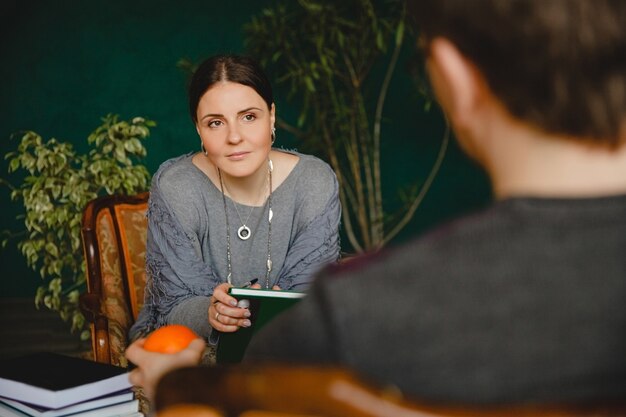The Essence of Person-Centered Therapy

 Person-centered therapy, also known as client-centered therapy, is a humanistic approach to psychotherapy that places the individual at the center of the therapeutic process. Developed by Carl Rogers in the mid-20th century, this therapeutic approach has gained widespread recognition for its focus on empathy, unconditional positive regard, and genuine understanding of the client’s experience. The world of person-centered therapy explores its core principles, techniques, and profound impact on psychology and counseling.
Person-centered therapy, also known as client-centered therapy, is a humanistic approach to psychotherapy that places the individual at the center of the therapeutic process. Developed by Carl Rogers in the mid-20th century, this therapeutic approach has gained widespread recognition for its focus on empathy, unconditional positive regard, and genuine understanding of the client’s experience. The world of person-centered therapy explores its core principles, techniques, and profound impact on psychology and counseling.
Understanding the Core Principles
Is founded on several core principles that guide the therapeutic process. These principles include:
Unconditional Positive Regard
Unconditional positive regard is at the heart. Therapists practicing this approach must offer their clients acceptance and non-judgmental support. This creates a safe and nurturing environment in which clients can explore their thoughts and feelings without fear of criticism.
Empathy
Empathy is a cornerstone of person-centered therapy. Therapists must demonstrate deep empathy towards their clients, striving to understand their experiences from their perspective. This empathetic connection fosters trust and encourages clients to open up about their emotions.
Congruence
Congruence, or genuineness, requires therapists to be authentic and transparent in their interactions with clients. It involves being honest about their feelings and reactions while maintaining a professional boundary. This authenticity helps build a strong therapeutic relationship.
Techniques in Person Centered Therapy
Person-centered therapy employs various techniques to facilitate personal growth and self-discovery. Some of the key techniques include:
Active Listening
Active listening is a fundamental skill in person-centered therapy. Therapists must listen attentively to the client, not just to their words but also to the underlying emotions and concerns. Reflecting on what the client is saying helps them feel heard and understood.
Reflection
Therapists use reflection to mirror the client’s thoughts and feelings. This technique encourages clients to explore their emotions further, gain insights, and develop a deeper understanding of themselves.
Open-Ended Questions
By asking open-ended questions, therapists invite clients to share more about their experiences and emotions. These questions do not have simple yes or no answers, allowing for a more in-depth exploration of the client’s inner world.
The Impact of Person-Centered Therapy
Person-centered therapy has had a profound impact on the field of psychology and counseling. Its emphasis on the therapeutic relationship, empathy, and unconditional positive regard has influenced various other therapeutic approaches.
Client-Centered Approach in Education
The principles of person therapy have been applied to education, creating student-centered approaches that prioritize individualized learning and emotional support.
Integration into Other Therapeutic Modalities
Person-centered techniques have been incorporated into other therapeutic modalities, such as cognitive-behavioral therapy and mindfulness-based therapies, enhancing their effectiveness.
Emphasis on Human Potential
Person-centered therapy underscores the belief in the inherent capacity for personal growth and self-actualization in every individual. This perspective has shaped the positive psychology movement, focusing on human strengths and well-being.
Conclusion
In conclusion, person-centered therapy stands as a testament to the power of genuine human connection and empathy in the realm of psychotherapy. Its principles and techniques continue to shape the way therapists approach their clients, emphasizing the importance of providing a safe, accepting, and empathetic space for personal growth and self-discovery.
FAQs
Is person suitable for all types of psychological issues?
can be beneficial for a wide range of psychological issues, but its effectiveness may vary depending on the individual and the specific concern. It is often used in combination with other therapeutic approaches for comprehensive treatment.
How does person-therapy differ from traditional psychoanalysis?
Person-therapy differs from traditional psychoanalysis in its emphasis on the client-therapist relationship and the belief in the client’s capacity for self-directed growth. Psychoanalysis tends to focus more on unconscious processes and interpretations.
Can I practice person-centered on my own without a therapist?
While some principles of can be applied in self-help and personal growth, it is recommended to seek the guidance of a trained therapist for a more effective and personalized experience. Therapists are equipped to provide the necessary support and insights during the therapeutic process.




